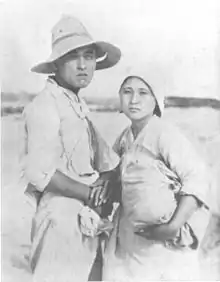A Ferry Boat That Has No Owner
A Ferry Boat That Has No Owner (임자없는 나룻배) is a 1932 Korean film starring Na Woon-gyu. Its title is also translated as "The Ownerless Ferry Boat". The film premiered at Dansungsa theater in downtown Seoul. This was director Lee Gyu-hwan's first film. This film is significant as the last pre-liberation film that was able to present an openly nationalistic message, because of increasing governmental censorship at this time.[1]
| A Ferry Boat That Has No Owner | |
|---|---|
 Na Woon-gyu in the film | |
| Hangul | |
| Revised Romanization | Imjaeomneun narutbae |
| McCune–Reischauer | Imja ŏmnŭn narutpae |
| Directed by | Lee Kyu-hwan |
| Written by | Lee Kyu-hwan |
| Produced by | Kang Jeong-won |
| Starring | Na Woon-gyu Moon Yae-bong Kim Yeon-sil Lim Woon-hak |
| Cinematography | Lee Myeong-woo |
| Edited by | Lee Kyu-hwan |
| Distributed by | Yoo Shin Kinema Company |
Release date |
|
| Country | Korea |
| Languages | Silent film Korean intertitles |
| Budget | 1,200 won |
Plot
The plot concerns Soo-sam, a farmer who goes to Seoul and works as a rickshaw man. He is jailed for stealing money to pay for his wife's hospital bills. Upon release from jail, he learns that his wife has had an affair. Disgusted, Soo-sam returns to his village with his daughter and becomes a ferry boat operator. When a bridge is constructed 10 years later, he loses his job. After the bridge engineer tries to rape his daughter, Soo-sam dies when he is hit by a train while trying to destroy the bridge. After their house burns, killing his daughter, Soo-sam's ferry boat remains as the "ownerless ferryboat" referred to in the title. The original final scene had Soo-sam taking an axe to the bridge. This was cut by governmental censors because, as Lee says, "to axe the bridge was to describe the anger of the Korean people against the Japanese occupation."[2]
References
Sources
- Kim, Kab-ui (2001). Chunsa Na Un-gyu chonjip: ku saengae wa yesul (춘사나운규전집: 그생애와예술). Seoul: Chimmundang. ISBN 89-303-0877-5.
- Lee, Young-il (1988). The History of Korean Cinema. Motion Picture Promotion Corporation. ISBN 89-88095-12-X.
- Min Eungjun; Joo Jinsook; Kwak HanJu (2003). Korean Film : History, Resistance, and Democratic Imagination. Westport, Connecticut: Praeger Publishers. ISBN 0-275-95811-6.